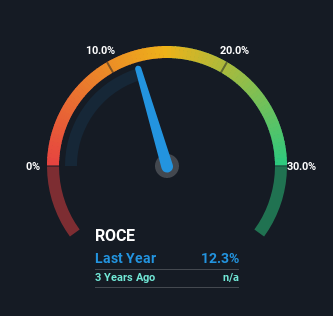- New Zealand
- /
- Specialty Stores
- /
- NZSE:2CC
Investors Could Be Concerned With NZ Automotive Investments' (NZSE:NZA) Returns On Capital

When it comes to investing, there are some useful financial metrics that can warn us when a business is potentially in trouble. Businesses in decline often have two underlying trends, firstly, a declining return on capital employed (ROCE) and a declining base of capital employed. This combination can tell you that not only is the company investing less, it's earning less on what it does invest. So after glancing at the trends within NZ Automotive Investments (NZSE:NZA), we weren't too hopeful.
Return On Capital Employed (ROCE): What Is It?
For those that aren't sure what ROCE is, it measures the amount of pre-tax profits a company can generate from the capital employed in its business. Analysts use this formula to calculate it for NZ Automotive Investments:
Return on Capital Employed = Earnings Before Interest and Tax (EBIT) ÷ (Total Assets - Current Liabilities)
0.12 = NZ$2.6m ÷ (NZ$36m - NZ$16m) (Based on the trailing twelve months to September 2022).
Therefore, NZ Automotive Investments has an ROCE of 12%. That's a pretty standard return and it's in line with the industry average of 12%.
See our latest analysis for NZ Automotive Investments

While the past is not representative of the future, it can be helpful to know how a company has performed historically, which is why we have this chart above. If you're interested in investigating NZ Automotive Investments' past further, check out this free graph of past earnings, revenue and cash flow.
SWOT Analysis for NZ Automotive Investments
- Debt is well covered by earnings.
- Earnings declined over the past year.
- Current share price is above our estimate of fair value.
- NZA's financial characteristics indicate limited near-term opportunities for shareholders.
- Lack of analyst coverage makes it difficult to determine NZA's earnings prospects.
- Debt is not well covered by operating cash flow.
What The Trend Of ROCE Can Tell Us
We are a bit worried about the trend of returns on capital at NZ Automotive Investments. Unfortunately the returns on capital have diminished from the 24% that they were earning one year ago. Meanwhile, capital employed in the business has stayed roughly the flat over the period. Companies that exhibit these attributes tend to not be shrinking, but they can be mature and facing pressure on their margins from competition. So because these trends aren't typically conducive to creating a multi-bagger, we wouldn't hold our breath on NZ Automotive Investments becoming one if things continue as they have.
Another thing to note, NZ Automotive Investments has a high ratio of current liabilities to total assets of 43%. This can bring about some risks because the company is basically operating with a rather large reliance on its suppliers or other sorts of short-term creditors. Ideally we'd like to see this reduce as that would mean fewer obligations bearing risks.
The Key Takeaway
In the end, the trend of lower returns on the same amount of capital isn't typically an indication that we're looking at a growth stock. It should come as no surprise then that the stock has fallen 69% over the last year, so it looks like investors are recognizing these changes. Unless there is a shift to a more positive trajectory in these metrics, we would look elsewhere.
On a final note, we found 3 warning signs for NZ Automotive Investments (1 can't be ignored) you should be aware of.
While NZ Automotive Investments isn't earning the highest return, check out this free list of companies that are earning high returns on equity with solid balance sheets.
New: Manage All Your Stock Portfolios in One Place
We've created the ultimate portfolio companion for stock investors, and it's free.
• Connect an unlimited number of Portfolios and see your total in one currency
• Be alerted to new Warning Signs or Risks via email or mobile
• Track the Fair Value of your stocks
Have feedback on this article? Concerned about the content? Get in touch with us directly. Alternatively, email editorial-team (at) simplywallst.com.
This article by Simply Wall St is general in nature. We provide commentary based on historical data and analyst forecasts only using an unbiased methodology and our articles are not intended to be financial advice. It does not constitute a recommendation to buy or sell any stock, and does not take account of your objectives, or your financial situation. We aim to bring you long-term focused analysis driven by fundamental data. Note that our analysis may not factor in the latest price-sensitive company announcements or qualitative material. Simply Wall St has no position in any stocks mentioned.
About NZSE:2CC
2 Cheap Cars Group
Engages in used automotive vehicle retailer and vehicle finance businesses in New Zealand.
Solid track record with excellent balance sheet.
Market Insights
Community Narratives




